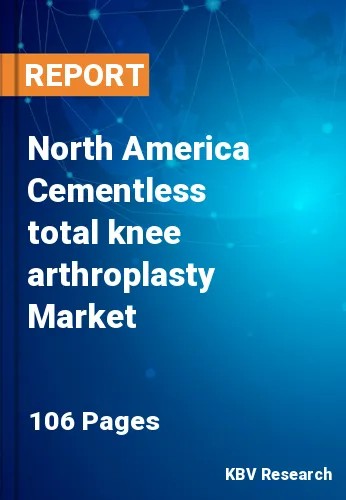The North America Cementless Total Knee Arthroplasty Market would witness market growth of 5.0% CAGR during the forecast period (2023-2030).
The incidence of total knee arthroplasty (TKA), one of the most frequently carried out elective surgical procedures, is rising. Cementless TKA may have gained popularity again due to the clinical effectiveness of cementless total hip arthroplasty (THA) fixation. Due to advancements in technology and design, current cementless TKA implants have significantly improved. A greater coefficient of friction and a decrease in Young's modulus mismatch between the implant and host bone has resulted from using porous tantalum and porous titanium metal surfaces.
Modern implants also feature biologically active surface coatings like hydroxyapatite and periapatite. These elements work together to boost the possibility of ingrowth by decreasing micromotion and enhancing osteoconductive qualities. Since cemented fixation produces respectable long-term results, it has long been the gold standard. Even though cement fixation has shown excellent results, aseptic loosening is still the most frequent reason for aseptic revision total knee replacement.
The longevity of the cemented fixation is complex and affected by factors relating to the patient as well as the surgical procedure. Because the bone-cement contact cannot be remodeled and is susceptible to failure under cyclical pressure, cemented components can become loose aseptically. TKA treatments are now performed on younger, heavier, more active patients. In this younger patient population, particularly in individuals under 55, there is a greater rate of aseptic loosening. Cementless TKA treatments have been developed due to the continued importance of increasing implant attachment and lifespan.
In 2020, 3.9 million adult Canadians above 20 were estimated to have arthritis, according to Statistics Canada. Arthritis is more common in older people and more prevalent in women. In addition, the market is expanding due to increased target illnesses, sports injuries, and the advantages of cementless total knee replacement systems. Currently, several knee replacement surgeries are performed annually in the United States, which will increase the demand for a cementless total knee system. Such considerations will probably increase the adoption of cementless total knee arthroplasty, which will help the market expand.
The US market dominated the North America Cementless Total Knee Arthroplasty Market by Country in 2022 and would continue to be a dominant market till 2030; thereby, achieving a market value of $842.3 Million by 2030. The Canada market is experiencing a CAGR of 7.4% during (2023 - 2030). Additionally, The Mexico market would exhibit a CAGR of 6.4% during (2023 - 2030).
Based on Product, the market is segmented into Fixed Bearing, and Mobile Bearing. Based on End User, the market is segmented into Hospitals, and Others. Based on Material, the market is segmented into Alloys, Ceramics, and Others. Based on countries, the market is segmented into U.S., Mexico, Canada, and Rest of North America.
Free Valuable Insights: The Worldwide Cementless total knee arthroplasty Market is Projected to reach USD 2.8 Billion by 2030, at a CAGR of 5.6%
The market research report covers the analysis of key stake holders of the market. Key companies profiled in the report include Johnson & Johnson, B. Braun Melsungen AG, Smith & Nephew PLC, Stryker Corporation, Olympus Corporation, Zimmer Biomet Holdings, Inc., MicroPort Scientific Corporation, United Orthopedic Corporation (Chi-Yi Investment Co. Ltd.), X.NOV and Waldemar Link GmbH & Co. KG.
By Product
By End User
By Material
By Country
Our team of dedicated experts can provide you with attractive expansion opportunities for your business.

